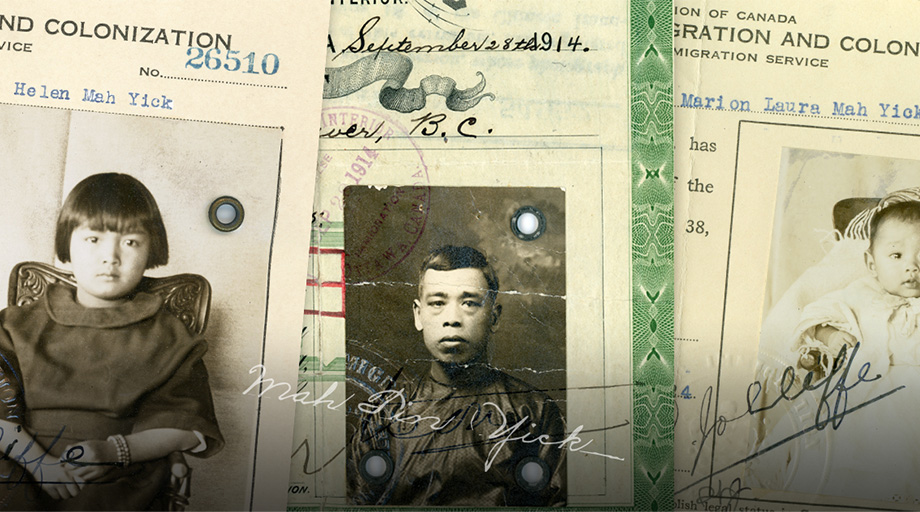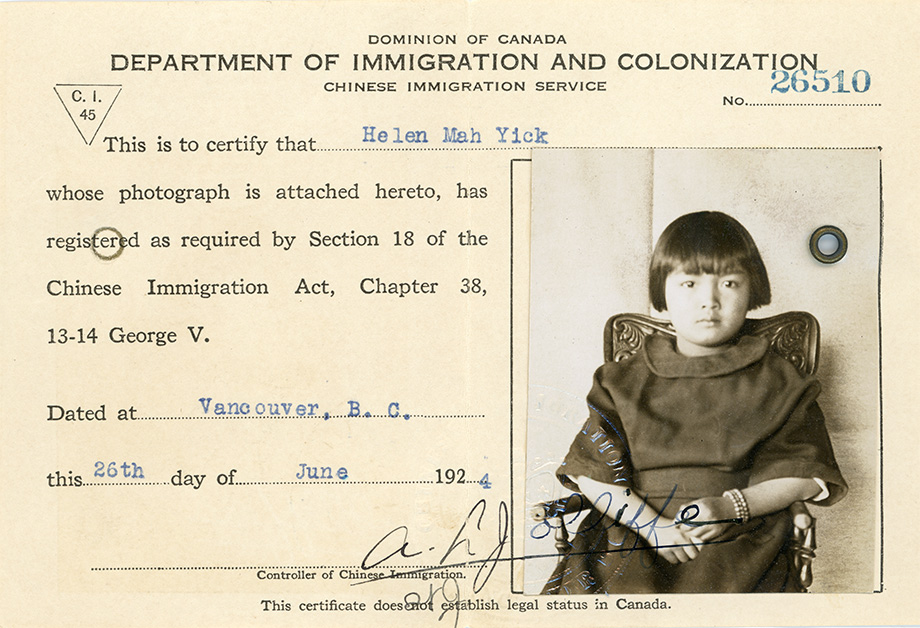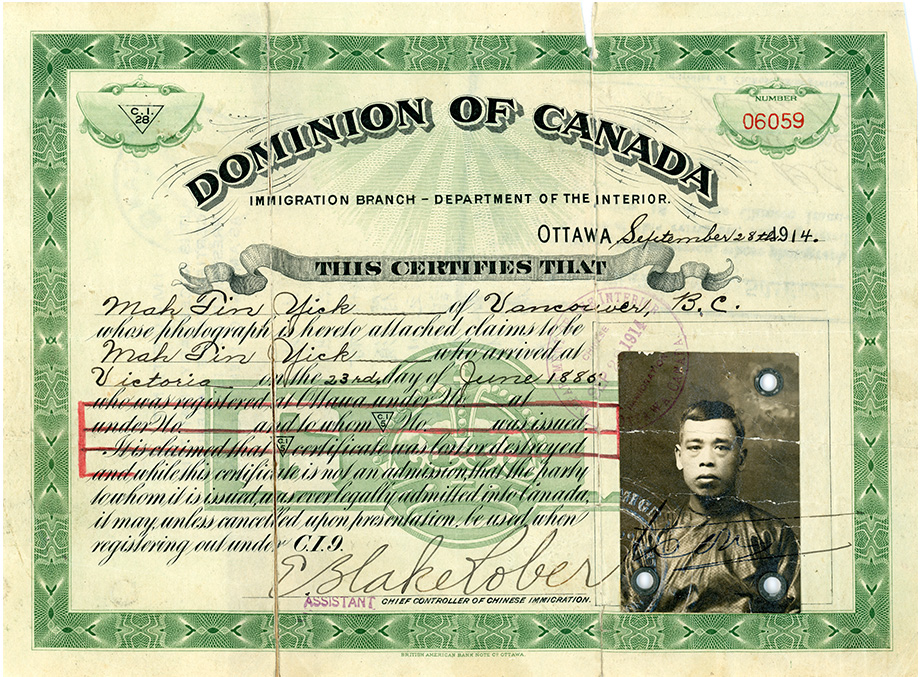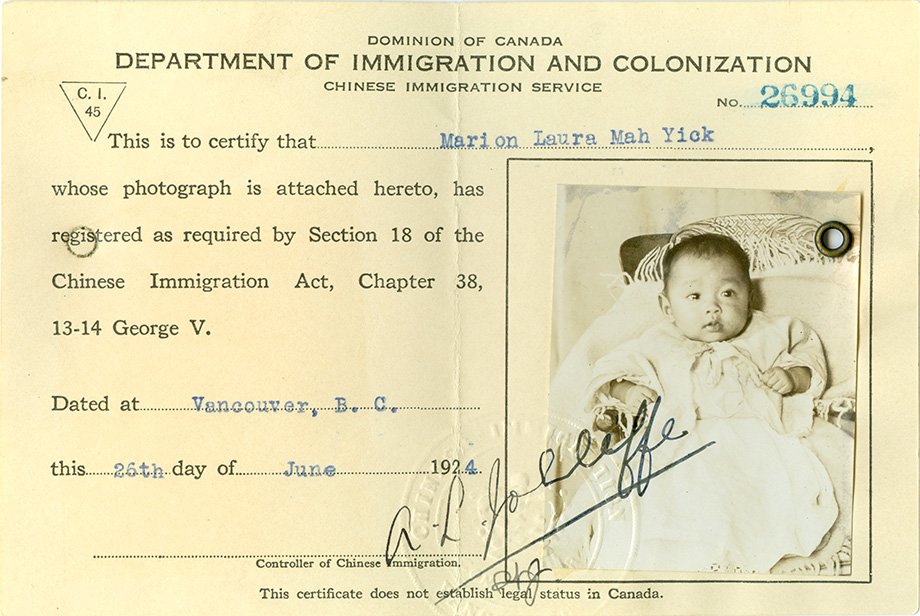
UBC Library Rare Books and Special Collections (RBSC), in partnership with The Paper Trail project team, has launched a digital archival collection of identity papers known as Chinese Immigration (C.I.) certificates created through Canada’s Chinese Immigration Act.
The Act was in force from 1885 to 1947. It introduced and tightened immigration restrictions through the Chinese head tax and its increasing sum, and culminated in the Chinese Immigration Act of 1923 that banned all further immigration. Passed into law on July 1st Dominion Day that year, the amendment is commonly called the Chinese Exclusion Act. It was effective in stemming Chinese immigration. It also resulted in cutting off the tens of thousands of Chinese residents already living in Canada from their families back in China. The law was finally repealed in 1947 after almost a quarter century.

RBSC-ARC-1838-DO-0122 C.I.45 certificate of Helen Mah Yick [Helen Mah]
Led by Catherine Clement, a community historian and curator based in Vancouver’s Chinatown, The Paper Trail project seeks to commemorate this era of exclusion that was “the darkest and most despairing period in Chinese Canadian history.” Families have been invited to share scans of their C.I. certificates and details about the individuals who once owned them, which make up the new digital archive.
“The Paper Trail collection is the largest research collection of Chinese immigration certificates that were issued to identify and register Chinese people in Canada, which included immigrants and their Canadian-born children,” says The Paper Trail’s archivist June Chow. “The collection is made possible through the engagement of community members in their family histories, and the role of these personal histories in the public history of the Chinese Exclusion Act. Having this collection means this defining chapter of Chinese Canadian history can now be actively remembered through those who lived through it.”

RBSC-ARC-1838-DO-0123 C.I.28 certificate of Mah Tin Yick
“This is the third project I’ve worked on under Catherine Clement,” notes Chow, who recently completed her Master of Archival Studies degree at the UBC School of Information. “The Paper Trail has been my research and training ground as a community archivist and as a Chinese Canadian Archivist.” She now also works as a special collections archivist of the Chinese Canadian Archive at the Toronto Public Library.
Clement collected scans of over 500 original C.I. certificates from families across Canada to research the Exclusion Act.
“Rare Books and Special Collections has worked with Catherine and June on other endeavors over the years, so I was familiar with their community history work and The Paper Trail project. When they approached us as a possible home for the digitized collection of Chinese Immigration certificates, I was honoured by the trust they were willing to place in us to house this important resource,” says Krisztina Laszlo, Archivist at UBC Library Rare Books and Special Collections.

RBSC-ARC-1838-DO-0186 C.I.45 certificate of Marion Laura Mah Yick [Marion Laura Mah]
Laszlo notes that the RBSC team and Chow worked closely to integrate the digitized material into a robust and searchable system. The digital archive will allow community researchers, students and faculty to easily access and learn from this resource. Each record in the collection includes high quality images of the C.I. certificate’s front and back matter, along with a biographical sketch of the individual based on memories shared by their children and grandchildren.
“Working with records of trauma is both difficult and rewarding. By preserving documentation that proves the intense and invasive manner the Government of Canada treated Chinese people in the country, it provides an opportunity to acknowledge the harm that was done. It also provides concrete evidence of actions taken, and the truth of that experience,” says Laszlo. “By making this resource available, we hope to serve the Chinese Canadian community and to honour the individuals and families impacted by policies of systemic racism. This is difficult history, but a history that must not be forgotten.”
“The Chinese Exclusion Act lasted a full generation; it was part of an overarching Chinese Immigration Act that was law for over six decades. A huge consequence and legacy of the legislation is the trauma, shame and silences that have been carried through generations of families, community and Canadians. We hope this collection supports individual and collective healing,” says Chow.
The digital archive is launched in tandem with the national exhibition curated by Clement titled, The Paper Trail to the 1923 Chinese Exclusion Act, that opens on July 1st, 2023, at the Chinese Canadian Museum in the historic Wing Sang building in Vancouver’s Chinatown. The Paper Trail project is one of numerous efforts and actions across Canada to commemorate 100 years since the Chinese Exclusion Act was passed into law.
About the featured images: Chinese persons who arrived prior to the passing of the 1885 Chinese Immigration Act were registered retroactively, as was the case of MAH Tin Yick. He ran a hand laundry in Salmon Arm, BC, and had a wife in Canada. Unfortunately, she died shortly after giving birth to the couple’s second child. By then, the Chinese Exclusion Act was in force. Daughters, Helen and Laura, were entrusted by their father to the Oriental Home and School in Victoria for their upbringing. Read more about this family and others in The Paper Trail collection.